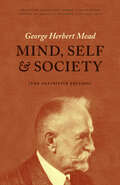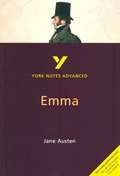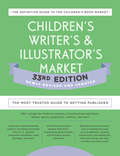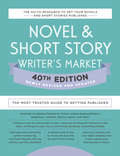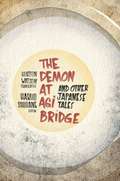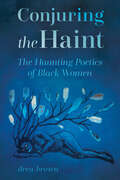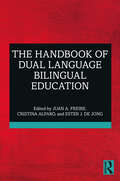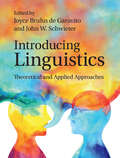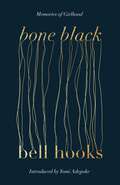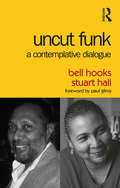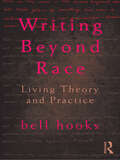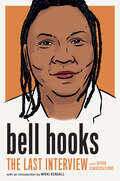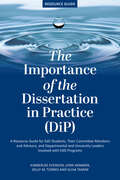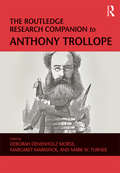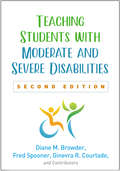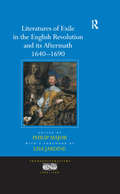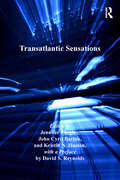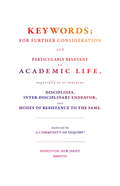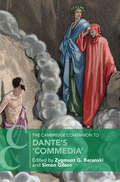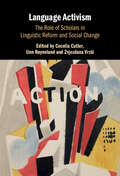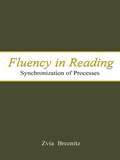- Table View
- List View
Mind, Self & Society: The Definitive Edition
by Hans Joas George Herbert Mead edited by Charles W. Morris annotated by Daniel R. HuebnerGeorge Herbert Mead is widely recognized as one of the most brilliantly original American pragmatists. Although he had a profound influence on the development of social philosophy, he published no books in his lifetime. This makes the lectures collected in Mind, Self, and Society all the more remarkable, as they offer a rare synthesis of his ideas. This collection gets to the heart of Mead’s meditations on social psychology and social philosophy. Its penetrating, conversational tone transports the reader directly into Mead’s classroom as he teases out the genesis of the self and the nature of the mind. The book captures his wry humor and shrewd reasoning, showing a man comfortable quoting Aristotle alongside Alice in Wonderland. Included in this edition are an insightful foreword from leading Mead scholar Hans Joas, a revealing set of textual notes by Dan Huebner that detail the text’s origins, and a comprehensive bibliography of Mead’s other published writings. While Mead’s lectures inspired hundreds of students, much of his brilliance has been lost to time. This new edition ensures that Mead’s ideas will carry on, inspiring a new generation of thinkers.
Emma - Notes
by Jane Austen edited by COLES EDITORIAL BOARDThe novel deals with one community, several families the two major characters - Emma Woodhouse and Knightley. The story reveals their friendship over 17 years the courtship that leads to their marriage. Intertwined with this simple story are the issues of marriage and freedom of choice, class consciousness and snobbery, morality, the evils of self-love and self-deception, and the consciousness of women.
Children's Writer's & Illustrator's Market 33rd Edition: The Most Trusted Guide to Getting Published
by edited by Amy JonesThe Most Trusted Guide to the World of Children's Publishing, fully revised and updatedThe 33rd edition of Children's Writer's and Illustrator's Market is the definitive and trusted guide for anyone who seeks to write or illustrate for kids and young adults. If you're a writer or an illustrator for young readers and your goal is to get published, CWIM is the resource you need. In this book, you'll find more than 500 listings for children's book markets, including publishers, literary agents, magazines, contests, and more. These listings include a point of contact, how to properly submit your work, and what categories each market accepts. This edition also features: • 500+ listings for children's markets, including book publishers, literary agents, magazines, contests, and more • Interviews with bestselling authors, including Cassandra Clare, N.K. Jemisin, Jacqueline Woodson, Leigh Bardugo, and more • Craft articles on topics ranging from P.O.V., mocking-up picture books, and including diverse characters • Business articles on topics such as making the most of your platform, tracking submissions, and maximizing the time + energy you have to write, and much more
Novel & Short Story Writer's Market 40th Edition: The Most Trusted Guide to Getting Published
by edited by Amy JonesThe best resource for getting your fiction published, fully revised and updatedNovel & Short Story Writer's Market is the go-to resource you need to get your short stories, novellas, and novels published. The 40th edition of NSSWM features hundreds of updated listings for book publishers, literary agents, fiction publications, contests, and more. Each listing includes contact information, submission guidelines, and other essential tips.This edition of Novel & Short Story Writer's Market also offers • Hundreds of updated listings for fiction-related book publishers, magazines, contests, literary agents, and more • Interviews with bestselling authors Celeste Ng, Viet Thanh Nguyen, Beverly Jenkins, and Chris Bohjalian • A detailed look at how to choose the best title for your fiction writing • Articles on tips for manuscript revision, using out-of-character behavior to add layers of intrigue to your story, and writing satisfying, compelling endings • Advice on working with your editor, keeping track of your submissions, and diversity in fiction
The Demon at Agi Bridge and Other Japanese Tales (Translations from the Asian Classics)
by Shirane Haruo ed. Translated by Burton WatsonBurton Watson and Haruo Shirane, renowned translators and scholars, introduce English-speaking readers to the vivid tradition of early and medieval Japanese anecdotal (setsuwa) literature. These orally narrated and written tales drew on both local folk tradition and continental sources. Taken from seven major anthologies of anecdotal literature compiled between the ninth and thirteenth centuries, these dramatic and often amusing stories open a major window onto the foundations of Japanese culture.Out of thousands of setsuwa, Shirane has selected thirty-eight of the most powerful and influential, each of which is briefly introduced. Recounting the exploits of warriors, farmers, priests, and aristocrats, and concerning topics as varied as poetry, violence, power, and sex, these tales reveal the creative origins of a range of literary and dramatic genres, from court tales and travel accounts to no drama and Kabuki. Watson's impeccable translations relay the wit, mystery, and Buddhist sensibility of these protean works, while Shirane's sophisticated analysis illuminates the meaning and context of their compact stories. Capped by an extensive bibliography, this collection fully immerses the reader in the thrilling world of secular and religious tales.
Conjuring the Haint: The Haunting Poetics of Black Women (Margaret Walker Alexander Series in African American Studies)
by drea brownWhat does it mean to live as a ghost, to live with ghosts, and how might ghosts lead to a path of healing and reimagining? Through an investigation of the intimate relationship between haunting and grief, Conjuring the Haint: The Haunting Poetics of Black Women posits that for Black women, haunting is both a condition and a strategy in lived experiences and literary productions.Looking at the poetry of Phillis Wheatley, Lucille Clifton, Ntozake Shange, Lyrae Van Clief-Stefanon, and Claudia Rankine, Conjuring the Haint explores primary stereotypes of Black women. They are aligned with unruly incarnations of the haint, probing the eerie similarities between this specter and one-dimensional imaginings of Black womanhood, examining how this haintliness manifests in Black women’s elegies, the poetry of grief. Disrupting a tradition of consolation and poetic succession, Black women’s elegies rework the genre by wrestling with multiple forms of death: physical, social, and spiritual. These elegies aim both to lay to rest and to resurrect. Black women poets are then repositioned as conjurers who, through the spirit work of poetry, reckon with haints as complex figures of despair and repair. Each chapter explores the paradox of haints, as evidence of injury and loss and as a pathway to knowledge articulated by various incarnations—the hag, the banshee, and the vengeful revenant. Chapters place these against pervasive images of Mammy, Jezebel, and Sapphire. Through a pairing and dismantling of these ill-fitting myths, Conjuring the Haint refigures haints as a means of recognition and self-possession, a manifestation of the ancestral and divine.
The Handbook of Dual Language Bilingual Education
by Juan A. Freire Cristina Alfaro de Jong, Ester JThis handbook presents a state-of-the-art overview of dual language bilingual education (DLBE) research, programs, pedagogy, and practice. Organized around four sections—theoretical foundations; key issues and trends; school-based practices; and teacher and administrator preparation—the volume comprehensively addresses major and emerging topics in the field. With contributions from expert scholars, the handbook highlights programs that honor the assets of language-minoritized and marginalized students and provides empirically grounded guidance for asset-based instruction. Chapters cover historical and policy considerations, leadership, family relations, professional development, community partnerships, race, class, gender, and more. Synthesizing major issues, discussing central themes and advancing policy and practice, this handbook is a seminal volume and definitive reference text in bilingual/second language education.
Introducing Linguistics: Theoretical and Applied Approaches
by John W. Schwieter de Garavito, Joyce BruhnEverything we do involves language. Assuming no prior knowledge, this book offers students a contemporary introduction to the study of language. Each thought-provoking chapter is accessible to readers from a variety of fields, and is helpfully organized across six parts: sound; structure and meaning; language typologies and change; language and social aspects; language acquisition; and language, cognition, and the brain. The book's companion website also offers three brief chapters on language and computers; animal communication; and dialectal varieties of English. The chapters feature illustrative tables, figures and maps, along with three types of pedagogical boxes (Linguistic Tidbits; Pause and Reflect; and Eyes on World Languages) that break up text, contextualize information, and provide colourful accents that give real data from languages across the globe. Key words are bolded and defined in a glossary at the end of the book, while end-of-chapter summaries and practice exercises reinforce the key points discussed.
Bone Black: Memories of Girlhood
by bell hooksOne of bell hooks' foundational works introduced to the UK for the first time.'With the emotion of poetry, the narrative of a novel, and the truth of experience, bell hooks weaves a girlhood memoir you won't be able to put down―or forget. Bone Black takes us into the cave of self-creation' Gloria SteinemStitching together the threads of her girlhood memories, bell hooks shows us one strong-spirited child's journey toward becoming the pioneering writer we know. Along the way, hooks sheds light on the vulnerability of children, the special unfurling of female creativity and the imbalance of a society that confers marriage's joys upon men and its silences on women.In a world where daughters and fathers are strangers under the same roof, and crying children are often given something to cry about, hooks uncovers the solace to be found in solitude, the comfort to be had in the good company of books.Bone Black allows us to bear witness to the awakening of a legendary author's awareness that writing is her most vital breath.
Uncut Funk: A Contemplative Dialogue
by Stuart Hall bell hooksIn an awesome meeting of minds, cultural theorists Stuart Hall and bell hooks met for a series of wide-ranging conversations on what Hall sums up as "life, love, death, sex." From the trivial to the profound, across boundaries of age, sexualities and genders, hooks and Hall dissect topics and themes of continual contemporary relevance, including feminism, home and homecoming, class, black masculinity, family, politics, relationships, and teaching. In their fluid and honest dialogue they push and pull each other as well as the reader, and the result is a book that speaks to the power of conversation as a place of critical pedagogy.
Writing Beyond Race: Living Theory and Practice
by bell hooksWhat are the conditions needed for our nation to bridge cultural and racial divides? By "writing beyond race," noted cultural critic bell hooks models the constructive ways scholars, activists, and readers can challenge and change systems of domination. In the spirit of previous classics like Outlaw Culture and Reel to Real, this new collection of compelling essays interrogates contemporary cultural notions of race, gender, and class. From the films Precious and Crash to recent biographies of Malcolm X and Henrietta Lacks, hooks offers provocative insights into the way race is being talked about in this "post-racial" era.
bell hooks: and Other Conversations (The Last Interview Series)
by bell hooks"Wide-ranging and insightful, this makes for a solid primer on hooks&’s ideas." --Publishers Weekly "I will not have my life narrowed down. I will not bow down to somebody else's whim or to someone else's ignorance." —bell hooksbell hooks was a prolific, trailblazing author, feminist, social activist, cultural critic, and professor. Born Gloria Jean Watkins, bell used her pen name to center attention on her ideas and to honor her courageous great-grandmother, Bell Blair Hooks.hooks&’s unflinching dedication to her work carved deep grooves for the feminist and anti-racist movements. In this collection of 7 interviews, stretching from early in her career until her last interview, she discusses feminism, the complexity of rap music and masculinity, her relationship to Buddhism, the &“politic of domination,&” sexuality, and love and the importance of communication across cultural borders. Whether she was sparking controversy on campuses or facing criticism from contemporaries, hooks relentlessly challenged herself and those around her, inserted herself into the tensions of the cultural moment, and anchored herself with love.
The Importance of the Dissertation in Practice (DiP): A Resource Guide for EdD Students, Their Committee Members and Advisors, and Departmental and University Leaders Involved with EdD Programs
by Kimberlee K. C. Everson Lynn Hemmer Kelly M. Torres and Suha R. TamimThe Importance of the Dissertation in Practice (DiP): A Resource Guide for EdD Students, Their Committee Members and Advisors, and Departmental and University Leaders Involved with EdD Programs is the first book-length study that looks at the elements of high-quality Dissertations in Practice (DiPs). It serves as a resource for EdD students, their committee members, their advisors, and departmental or university leaders involved with EdD programs. The book can be used to improve support from key stakeholders within EdD programs for the implementation of the DiP in the development of practitioner-scholars. <P><P> The first section of the book discusses the difference between the DiP and traditional dissertations, the history of the DiP, and how the practitioner-scholar is developed through the DiP process. Next, the book describes the elements that are reflective of a high-quality DiP. Finally, it addresses a few of the unique formats that are sometimes used with the DiP, some of the practical issues with implementing the DiP, and issues of the future including the use of artificial intelligence. <P><P> The ultimate goal of The Importance of the Dissertation in Practice is to serve as a practical guide for all those involved with the DiP, reflecting the editors’ and authors’ experiences working with students within a variety of higher education institutions.
The Routledge Research Companion to Anthony Trollope
by Deborah Denenholz Morse Margaret Markwick and Mark W. TurnerBringing together leading and newly emerging scholars, The Routledge Research Companion to Anthony Trollope offers a comprehensive overview of Trollope scholarship and suggests new directions in Trollope studies. The first volume designed especially for advanced graduate students and scholars, the collection features essays on virtually every topic relevant to Trollope research, including the law, gender, politics, evolution, race, anti-Semitism, biography, philosophy, illustration, aging, sport, emigration, and the global and regional worlds.
Reading Milestones Level 2 Blue Book 8
by Susan Rose Stephen P. Quigley Patricia L. McAnally and Cynthia M. KingREADING MILESTONES LEVEL 2 * BLUE BOOK 8 FOURTH EDITION
Reading Milestones: Blue Book 1
by Susan Rose Stephen P. Quigley Patricia L. McAnally and Cynthia M. KingReading Milestones is a reading series with controlled syntax and vocabulary. Each level has 10 Readers, Workbook activities, Spelling activities, and a Teacher's Guide.
Teaching Students with Moderate and Severe Disabilities, Second Edition
by Diane M. Browder Fred Spooner Ginevra R. Courtade and ContributorsFor years the text of choice for developing excellence as a teacher of K–12 students with moderate and severe disabilities, this clearly written work has now been revised and updated. Chapters provide step-by-step procedures for designing standards-based individualized education plans and evaluating and enhancing student progress. Methods and materials for teaching literacy, mathematics, science, and social studies are described in depth. The book also describes effective ways to build functional daily living skills. User-friendly features include extensive vignettes and classroom examples, end-of-chapter application exercises, and reproducible planning and assessment tools. Purchasers get access to a Web page where they can download and print the reproducible materials in a convenient 8 1/2" x 11" size. New to This Edition *Reflects important advances in research and evidence-based practice. *Chapter on collaborating with culturally diverse families, plus a stronger multicultural focus throughout. *Chapter on writing instruction. *Two additional chapters on reading and math, ensuring coverage of both foundational and grade-aligned skills. *Increased attention to students with autism spectrum disorder and to uses of technology.
Literatures of Exile in the English Revolution and its Aftermath, 1640-1690 (Transculturalisms, 1400-1700)
by a foreword JardineOriginal and thought-provoking, this collection sheds new light on an important yet understudied feature of seventeenth-century England's political and cultural landscape: exile. Through an essentially literary lens, exile is examined both as physical departure from England-to France, Germany, the Low Countries and America-and as inner, mental withdrawal. In the process, a strikingly wide variety of contemporary sources comes under scrutiny, including letters, diaries, plays, treatises, translations and poetry. The extent to which the richness and disparateness of these modes of writing militates against or constructs a recognisable 'rhetoric' of exile is one of the book's overriding themes. Also under consideration is the degree to which exilic writing in this period is intended for public consumption, a product of private reflection, or characterised by a coalescence of the two. Importantly, this volume extends the chronological range of the English Revolution beyond 1660 by demonstrating that exile during the Restoration formed a meaningful continuum with displacement during the civil wars of the mid-century. This in-depth and overdue study of prominent and hitherto obscure exiles, conspicuously diverse in political and religious allegiance yet inextricably bound by the shared experience of displacement, will be of interest to scholars in a range of disciplines.
Transatlantic Sensations (Ashgate Series in Nineteenth-Century Transatlantic Studies)
by John Cyril Barton Kristin N. Huston a Preface ReynoldsBringing together sensation writing and transatlantic studies, this collection makes a convincing case for the symbiotic relationship between literary works on both sides of the Atlantic. Transatlantic Sensations begins with the 'prehistories' of the genre, looking at the dialogue and debate generated by the publication of sentimental and gothic fiction by William Godwin, Susanna Rowson, and Charles Brockden Brown.Thus establishing a context for the treatment of works by Louisa May Alcott, Mary Elizabeth Braddon, Dion Boucicault, Wilkie Collins, Charles Dickens, George Lippard, Charles Reade, Harriet Beecher Stowe and George Thompson, the volumetakes up a wide range of sensational topics including sexuality, slavery, criminal punishment, literary piracy, mesmerism, and the metaphors of foreign literary invasion and diseased reading. Concluding essays offer a reassessment of the realist and domestic fiction of George Eliot, Charlotte Yonge, and Thomas Hardy in the context of transatlantic sensationalism, emphasizing the evolution of the genre throughout the century and mapping a new transatlantic lineage for this immensely popular literary form. The book's final essay examines an international kidnapping case that was a journalistic sensation at the turn of the twentieth century.
Keywords;: For Further Consideration and Particularly Relevant to Academic Life, &c.
by D. Graham Burnett a Community of Inquiry Matthew Rickard Jessica TerekhovAn irreverent critical lexicon of academic life and cultureThe university: The very name evokes knowledge, culture, and the magnificently universal ambition at the heart of this essential institution. Bastions of free inquiry and a free society, engines of social transformation and economic progress, enclosed gardens of ennobling reflection and creation, universities encompass the wisdom of the past and the hope of the future. Or do they? This critical glossary—written by a group of Princeton graduate students and faculty—defines fifty-eight terms common to academic life in a style that will prick both egos and consciences. From “academia” to “vocation,” “canon” to “peer review,” “discipline” to “methodology,” the book scrutinizes the often stultifying structures of modern disciplinary life, calls out a slavish devotion to “knowledge production” as the enemy of thought, and even dissects the notion of “academic excellence.” Feisty and darkly funny, passionate and deeply insightful, this book raises hard questions about teaching, research, theory, practice, and academic labor. The result is a must-read dispatch from today’s academic trenches—one that is sure to provoke discussion and debate.
Dante in Context
by Zygmunt G. BarańskiIn the past seven centuries Dante has become world renowned, with his works translated into multiple languages and read by people of all ages and cultural backgrounds. This volume brings together interdisciplinary essays by leading, international scholars to provide a comprehensive account of the historical, cultural and intellectual context in which Dante lived and worked: from the economic, social and political scene to the feel of daily life; from education and religion to the administration of justice; from medicine to philosophy and science; from classical antiquity to popular culture; and from the dramatic transformation of urban spaces to the explosion of visual arts and music. This book, while locating Dante in relation to each of these topics, offers readers a clear and reliable idea of what life was like for Dante as an outstanding poet and intellectual in the Italy of the late Middle Ages.
The Cambridge Companion to Dante's ‘Commedia' (Cambridge Companions to Literature)
by Zygmunt G. Barański Simon GilsonThis newly commissioned volume presents a focused overview of Dante's masterpiece, the Commedia, offering readers of today wide-ranging insights into the poem and its core features. Leading scholars discuss matters of structure, narrative, language and style, characterization, doctrine, and politics, in chapters that make their own contributions to Dante criticism by raising problems and questions that call for renewed attention, while investigating contextual concerns as well as the current state of criticism about the poem. The Commedia is also placed in a variety of cultural and historical contexts through accounts of the poem's transmission and reception that explore both its contemporary influence and its continuing legacy today. With its accessible approach, its unstinting focus on the poem and its attention to matters that have not always received adequate critical assessment, this volume will be of value to all students and scholars of Dante's great poem.
Dante the Lyric and Ethical Poet: Dante Lirico E Etico
by Zygmunt G. Bara'nski"This book presents the proceedings of the fifth meeting of the International Dante Seminar. As with previous volumes, the proceedings also include a carefully edited account of the extensive discussions which followed the presentations. The papers, given by some of the leading international scholars of the poet - from Italy, the UK and the USA - address four major topics of particular concern to present-day Dante studies: Dante as a lyric poet; Dante as an ethical poet; Dante and the Eclogues; and Dante in nineteenth-century Britain. These topics reflect both areas which are currently the subject of heated critical debate (several editions of the lyric poems are in preparation, and the ethical dimension of Dantes works is very much under discussion) and areas which are long overdue a reassessment (Dantes remarkable revival of Latin pastoral poetry, and the extraordinary British contribution to Dante studies in the nineteenth century). As this set of conference proceedings makes clear, in Dante and in his legacy, ethics and poetry are inseparable. The contributors include Paola Allegretti, Michael Caesar, Paolo Falzone, Manuele Gragnolati, Claudio Giunta, Claire Honess, Robin Kirkpatrick, John Lindon, Lino Pertile, Justin Steinberg, Claudia Villa, and Diego Zancani."
Language Activism: The Role of Scholars in Linguistic Reform and Social Change
by Cecelia Cutler Unn Røyneland Zvjezdana VrzićBringing together a renowned group of scholars from a range of disciplines – sociolinguistics, linguistic anthropology, philosophy of language, and language documentation – this book explores the role academics can play in language activism. It surveys the most common tensions that language researchers experience in their attempts to enact social change through their work, such as how far they can become politically involved, how they can maintain objectivity in an activist role, whether their work can ever be apolitical, and what ideologies they propagate. In a series of concise original chapters, each author discusses their own experiences and personal concerns; some offering more theoretically informed elaborations on the topic of language activism. Showcasing the state-of-the-art in language activism, this book is essential reading for anyone considering the need for scholarly engagement with the public and the communities in which they work, and the impact that this activism can have on society.
Fluency in Reading: Synchronization of Processes
by Zvia BreznitzThis is the first book to examine in-depth the crucial role of the speed of information processing in the brain in determining reading fluency in both normal and dyslexic readers.Part I explains fluency in reading from both traditional and modern perspectives. Fluency has historically been viewed as the outcome of other reading-related factors and has often been seen as a convenient measure of reading skills. This book, however, argues that fluency has a strong impact on other aspects of reading and plays a central role in the entire reading process.Part II deals with the determinants of reading fluency. Chief among these is the speed of information processing in the brain. Using both behavioral and electrophysiological evidence, the book systematically examines the features of processing speed in the various brain systems involved in reading: visual-orthographic, auditory-phonological, and semantic and shows how speed of processing affects fluency in reading.Part III deals with the complex issues of cross-modal integration and specifically with the need for effective synchronization of the brain processes involved in reading. It puts forward the Synchronization Hypothesis and discusses the role of the Asynchrony Phenomenon as a major factor in dyslexia. Finally, it summarizes research on manipulating reading rate by means of the Acceleration method, providing evidence for a possible intervention aimed at reducing Asynchrony.Key features of this outstanding new book include:*Expanded View of Fluency. Reading fluency is seen as both a dependent and an independent Variable. Currently available books focus on reading rate solely as the outcome of other factors whereas this volume stresses that it is both an outcome and a cause.*Information Processing Focus. Fluency itself is determined to a large extent by a more general factor, namely, speed of processing in the brain. The book presents wide-ranging evidence for individual differences in speed of processing across many subpopulations.*Brain Synchronization Focus. The book posits a new theory arguing that effective reading requires synchronization of the different brain systems: visual orthographic, auditory-phonological, and semantic.*Research-Based Interventions. Interventions to enhance fluency and, thereby, reading skills in general are presented in detail.*Author Expertise. Zvia Breznitz is Head of the Department of Learning Disabilities and Director of the Laboratory for Neurocognitive Research at Haifa University in Israel, where she has been researching this topic for over a decade.This book is appropriate for researchers and advanced students in reading, dyslexia, learning disabilities, cognitive psychology, and neuropsychology.
